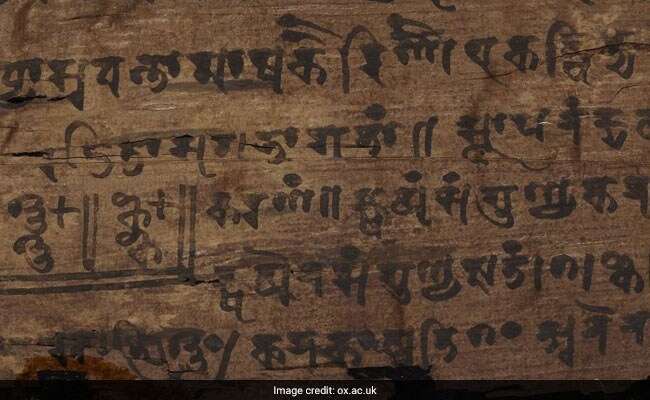
Oxford Scientists Find Earliest Use Of 'Zero' Earlier Than First Thought
New Delhi:
Using Carbon Dating, Scientists from University of Oxford's Bodleian Libraries have found that 'Zero' originated at least 500 years before than what scholars earlier thought. The findings came into light after scientists from Oxford examined famous ancient Indian scroll, the Bakhshali manuscript. The text dates back to third or fourth century and has been held by the Bodleian library since 1902. The Bakhshali manuscript is possibly the oldest Indian Mathematical text and exhibits the earliest concept of 'zero' which began as a simple dot.
Before this finding, the earliest record of the use of 'zero' was believed to be a 9th century inscription on the wall of a temple in Gwalior, Madhya Pradesh.
Other civilizations such as the Mayans and Babylonians and also used a similar system of zero placeholder, but it was the dot used in the Bakhshali manuscript which eventually evolved in the symbol which we presently known as 'zero'. Also, it was in India where 'zero' placeholder developed as a number in its own right.
Talking about the importance of the discovery of 'zero' placeholder, Marcus du Sautoy, Professor of Mathematics at the University of Oxford, said, "Today we take it for granted that the concept of zero is used across the globe and is a key building block of the digital world. But the creation of zero as a number in its own right, which evolved from the placeholder dot symbol found in the Bakhshali manuscript, was one of the greatest breakthroughs in the history of mathematics. We now know that it was as early as the 3rd century that mathematicians in India planted the seed of the idea that would later become so fundamental to the modern world. The findings show how vibrant mathematics have been in the Indian sub-continent for centuries."
The Bakhshali manuscript, was found buried in a field in a village named Bakhshali which is now in Pakistan. It is considered to be the oldest existing mathematical text however, the exact date of the manuscript was contested. The new carbon dating study revealed the reason why it was difficult to determine the exact age of the manuscript, because it is composed of materials from at least three different periods.
Click here for more Education News
Before this finding, the earliest record of the use of 'zero' was believed to be a 9th century inscription on the wall of a temple in Gwalior, Madhya Pradesh.
Other civilizations such as the Mayans and Babylonians and also used a similar system of zero placeholder, but it was the dot used in the Bakhshali manuscript which eventually evolved in the symbol which we presently known as 'zero'. Also, it was in India where 'zero' placeholder developed as a number in its own right.
Talking about the importance of the discovery of 'zero' placeholder, Marcus du Sautoy, Professor of Mathematics at the University of Oxford, said, "Today we take it for granted that the concept of zero is used across the globe and is a key building block of the digital world. But the creation of zero as a number in its own right, which evolved from the placeholder dot symbol found in the Bakhshali manuscript, was one of the greatest breakthroughs in the history of mathematics. We now know that it was as early as the 3rd century that mathematicians in India planted the seed of the idea that would later become so fundamental to the modern world. The findings show how vibrant mathematics have been in the Indian sub-continent for centuries."
The Bakhshali manuscript, was found buried in a field in a village named Bakhshali which is now in Pakistan. It is considered to be the oldest existing mathematical text however, the exact date of the manuscript was contested. The new carbon dating study revealed the reason why it was difficult to determine the exact age of the manuscript, because it is composed of materials from at least three different periods.
Click here for more Education News
